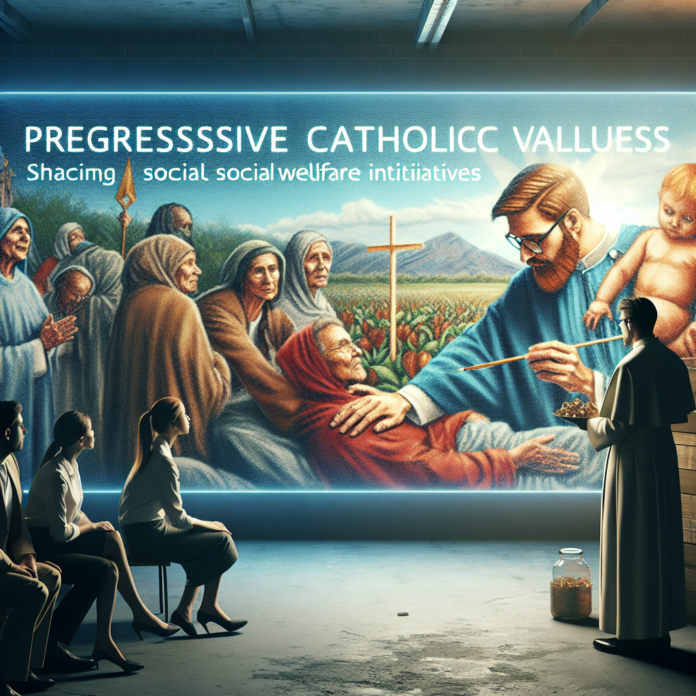Social Welfare: How Progressive Catholic Values Inform Policy Choices
In the rapidly evolving landscape of social welfare, the intersection of faith and policy has emerged as a compelling dialogue, particularly within the domain of progressive Catholic values. Historically rooted in teachings of compassion, equality, and justice, progressive Catholicism offers a rich tapestry of principles that are not just spiritually enlightening but also pragmatically relevant in today’s socio-political context.
Historical Context: A Tradition of Progressive Advocacy
The roots of progressive Catholicism can be traced back to the social teachings of Pope Leo XIII in his 1891 encyclical "Rerum Novarum." Here, the Catholic Church explicitly supported labor unions and criticized the vast inequalities wrought by unchecked capitalism. This landmark document laid the foundation for future Catholic advocacy for workers’ rights, fair wages, and social justice—a clear divergence from a purely traditionalist outlook that often emphasized a more hierarchical, less interventionist role for governance.
Throughout the 20th century, the progressive wing of Catholicism continued to bear fruit. Notable figures such as Dorothy Day and the Catholic Worker Movement emphasized living in solidarity with the poor and marginalized. Their efforts were pivotal in weaving Catholic values into the social fabric of American life, arguing that our moral mandate requires not just charity but also systemic change.
Fast forward to the Second Vatican Council in the 1960s, which catalyzed a renewed emphasis on social justice. The council’s documents underscored the imperative for Catholics to engage in the public sphere, advocating for policies that uphold human dignity and promote the common good. Such initiatives are a clear testament to how progressive Catholic values have long championed a more just and equitable society.
Progressive Catholicism in Contemporary Policy
In the present day, progressive Catholic values are often invoked to support a variety of social welfare policies, from healthcare reform to immigration.
Healthcare as a Right
A poignant example is the Catholic Church’s stance on universal healthcare. Rooted in the belief that all human beings are created in the image of God, progressive Catholic thought argues vehemently against a system that commodifies human health. This perspective gained significant traction during the debates over the Affordable Care Act (ACA) in the United States. Progressive Catholic leaders and organizations were vocal advocates for the ACA, citing its alignment with catholic social teaching principles like solidarity and the preferential option for the poor.
Immigration and Compassion
Moreover, the Church’s advocacy on immigration issues exemplifies its progressive social stance. The Catholic tradition has consistently emphasized welcoming the stranger, a call that resonates powerfully in today’s polarized environment. In recent years, notable Catholic institutions have been at the forefront of defending immigrant rights. For instance, the United States Conference of Catholic Bishops (USCCB) has condemned policies that separate families and dehumanize migrants—policies often supported by conservative factions. This resistance is not merely a moral stand but also a practical invocation of progressive Catholic values to shape humane and just immigration laws.
Economic Justice
Economic policies, too, are ripe grounds for the application of these values. The progressive Catholic emphasis on economic justice critiques the vast disparities in wealth and power that define much of modern society. Referencing Pope Francis’s forceful denunciation of the “economy of exclusion,” Catholic progressives call for policies that address systemic inequities—advocating for living wages, social safety nets, and more equitable tax policies.
The Troubled Conservative Counterpoint
In contrast, Catholic conservatism often finds itself in a convoluted relationship with these progressive values. While traditionalists emphasize the importance of personal charity and community-based support, they frequently fall short in endorsing systemic changes necessary for comprehensive social welfare. This reluctance sometimes translates into opposition to policies like universal healthcare or progressive taxation, which they argue undermine the family or promote dependency.
This traditionalist stance ironically contradicts key elements of Catholic social teaching and often appears anachronistic in today’s context, where systemic issues require systemic solutions. It is no coincidence that significant segments of the global Catholic population view progressive policies as more authentically Catholic—rooted as they are in the principles of social justice, human dignity, and the common good.
Recent Developments and Ongoing Advocacy
Recent news headlines underscore the relevance of progressive Catholic values in informing policy decisions. For instance, the Catholic Church’s steadfast opposition to the rollback of environmental protections highlights an essential moral dimension to ecological issues, as expounded in Pope Francis’s encyclical "Laudato Si’." This document is a clarion call for addressing climate change and environmental degradation through collective action—a paradigm shift largely ignored by staunchly conservative Catholics preoccupied with free-market absolutism.
Additionally, Pope Francis’s overt support for LGBTQ rights, including his condemnation of laws that criminalize homosexuality, marks a progressive shift away from the Church’s historically conservative stance. This advocacy has practical policy implications, urging nations to adopt more inclusive and humane legal frameworks.
Conclusion
In conclusion, progressive Catholic values offer a profound and actionable framework for informing social welfare policies. Historically and contemporarily, these values advocate for systemic justice that acknowledges and addresses the inherent dignity of every human being. As we navigate the complexities of the modern world, the Catholic call to social justice—rooted in progressivism—serves as both a moral compass and a practical guide for policy-making aimed at achieving true societal well-being.
